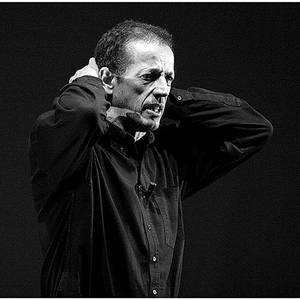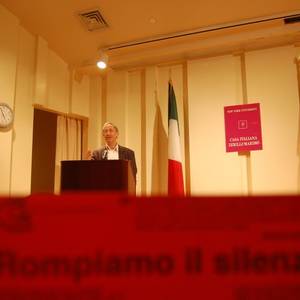The book “Italy Today. Politics, economy, and society” is a collection of essays that analyzes various aspects of the present Italian social, political and economical situation, singling out the structural components that make the country “the sick man of Europe”. The work was presented on November 20th at Casa Italiana Zerilli Marimò
You chose: stefano albertini
-
-
Art & CultureA portrait of the Futurist woman that goes beyond the critical approach to the actual movement is on display at Casa Italiana Zerilli-Marimò.
-
Art & Culture"Graphic Works" by Alberto Burri will be on view until October 23. The opening of the exhibit saw also the participation of Antonio Sapone, a representative of the “Fondazione Palazzo Albizzini Collezione Burri”
-
“Our aim has always been to offer a free forum, where all ideas can be discussed. Academic freedom is the first principle that we respect”. Past and future at Casa Italiana Zerilli Marimò: a conversation with Director Stefano Albertini
-
Intervista a Marco Baliani dopo il suo spettacolo newyorkese" Corpo di stato", recitato alla casa Italiana Zerilli-marimò
-
i-Italy met with Paul Ginsborg at New York University’s Casa Italiana Zerilli- Marimò. It was a unique opportunity to reflect on Italian democracy and the threats it currently faces. Is what Alexis de Tocqueville wrote about the “tyranny of the majority” still important?
-
At Gramercy Park’s National Arts Club, 60-foot panels by the School of Painters of Poto Poto, Congo and presentation of the book Brazzà in Congo: A Life and Legacy. Interview with author Idanna Pucci.
-
Casa Italiana Zerilli-Marimò (NYU) in Manhattan. Historian and public intellectual Paul Ginsborg analyzes Berlusconi and his opposition at "Denuncia: Speaking Up in Modern Italy"
-
I met her by chance at a conference and could not believe my ears and eyes when she stood up and declared “I am a proud African-Italian-American!” Here is the story of this exquisite and incredibly rare Zuppa Mista!
-
The recent visit of the famous Italian singer revealed to be a rich and fulfilling experience both for him and his traditional public. It was also a great occasion to introduce his music to Americans. Here the main stops of his “New York Tour”.





































